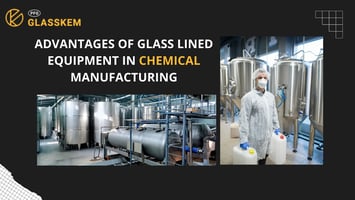In the realm of demanding chemical processing applications, where precision, purity, and durability...
Exploring the Advantages of Glass-Lined Heat Exchangers: A Comprehensive Guide

In the realm of industrial equipment, the utilization of glass-lined heat exchangers stands as a testament to innovation and efficiency. These sophisticated pieces of machinery play a pivotal role in various industries, offering unparalleled advantages in heat transfer processes. Understanding the benefits of glass-lined heat exchangers and their application in diverse sectors is crucial for maximizing operational efficacy. This comprehensive guide delves into the advantages of glass-lined heat exchangers and their significance in different industrial settings.
Understanding Glass-Lined Heat Exchangers:
Glass-lined heat exchangers are meticulously engineered equipment designed for heat transfer applications in chemical, pharmaceutical, food processing, and other industries. These exchangers boast a construction where the internal surfaces are coated with a layer of glass, providing exceptional resistance to corrosion and chemical reactions. The robustness of glass lining combined with the functionality of heat exchange mechanisms makes these systems highly sought-after across multiple sectors.
Advantages of Glass-Lined Heat Exchangers:
Superior Corrosion Resistance:
- The primary advantage of glass-lined heat exchangers lies in their exceptional resistance to corrosion. The glass layer shields the internal surfaces from corrosive elements, acids, alkalis, and various reactive substances encountered during heat transfer processes. This resistance extends the lifespan of the equipment, reducing maintenance costs and downtime significantly.
Enhanced Cleanability:
- Glass lined equipment, including heat exchangers, offers a smooth and non-porous surface that facilitates easy cleaning. The non-stick properties of glass prevent the accumulation of contaminants and residue, ensuring thorough and efficient cleaning cycles. This feature is vital, especially in industries where hygiene and cleanliness standards are stringent, such as pharmaceutical and food processing.
Versatility in Applications:
- Glass-lined heat exchangers are versatile and adaptable to a wide array of applications. Their ability to handle different temperatures, pressures, and various corrosive media makes them suitable for diverse industrial processes. From heating and cooling applications to condensation and evaporation processes, these heat exchangers excel in multiple scenarios, offering efficiency and reliability.
Thermal Efficiency:
- Efficient heat transfer is pivotal in many industries, and glass-lined heat exchangers excel in this aspect. The glass lining's thermal conductivity ensures optimal heat transfer rates, contributing to enhanced energy efficiency and reduced operational costs. This efficiency makes them an ideal choice for industries focused on optimizing energy consumption.
Environmental Friendliness:
- Glass-lined equipment aligns with sustainable practices due to its inert nature and recyclability. The glass lining is non-toxic and does not contaminate the processed materials, making it environmentally friendly. Moreover, the recyclability of glass ensures a reduced ecological footprint, appealing to industries striving for eco-conscious operations.
Applications Across Industries:
Glass-lined heat exchangers find applications in various sectors, including chemical processing, pharmaceuticals, food and beverage, petrochemicals, and more. In the pharmaceutical industry, these exchangers are utilized for precise temperature control in drug manufacturing. Similarly, in the chemical industry, they facilitate efficient heat transfer in reaction processes without the risk of contamination.
Conclusion:
Glass-lined heat exchangers epitomize reliability, efficiency, and versatility in the realm of industrial equipment. Their exceptional resistance to corrosion, ease of cleaning, adaptability, thermal efficiency, and eco-friendliness make them indispensable across diverse industries. Understanding the advantages and applications of glass-lined heat exchangers underscores their significance in optimizing industrial processes while ensuring cost-effectiveness and sustainability.
In conclusion, investing in glass-lined heat exchangers proves to be a prudent choice for industries seeking top-notch performance and durability in their heat transfer operations.
Read More :- THE FUTURE OF GLASS-LINED EQUIPMENT: TRENDS AND INNOVATIONS TO WATCH



